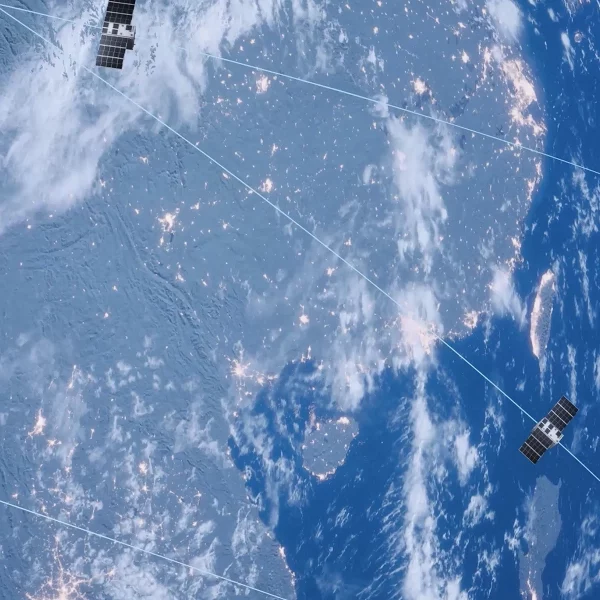Spacecoin to Launch Broadband Satellites for Decentralised Starlink Alternative UPDATE2

A new company called Spacecoin, which aims to build a “decentralised” alternative to Starlink’s global mega constellation of ultrafast broadband satellites in Low Earth Orbit (LEO), will today attempt to launch three satellites from Vandenberg Space Force Base as part of its mission to extend internet connectivity to the 2.6 billion people globally who remain offline.
The new network aims to deploy a constellation of small satellites (CubeSats) into LEO that will eventually deliver global reach, albeit while also being able to operate independently of terrestrial infrastructure. This approach is designed to ensure reliable access even during natural disasters, government restrictions (there’s a strong focus on delivering “censorship-resistant internet access“), and in remote or geographically challenging regions where traditional internet connectivity may fail.
The technical specifications and network capability goals of the new network remain a little unclear, although Spacecoin has already launched one prototype 8U (2×4U) CubeSat (CTC-0) into orbit. The next batch of three additional satellites (CTC-1 constellation) were due to launch today and will be used to conduct pilot tests with partners in Africa and Southeast Asia.
Advertisement
The CTC-1 satellites will adopt the larger and heavier 16U CubeSat standard to support their more advanced capabilities, whatever those may be. But the first commercial services aren’t expected to go live until sometime in 2026, which seems set to be supported by further satellite launches to expand coverage and enable third-parties to deploy satellites that interoperate with their network.
“While CTC-0 proved that blockchain transactions can be transmitted end-to-end through space, CTC-1 focuses on validating the network layer itself by testing seamless inter-satellite handoffs and direct in-orbit data exchange. Once these capabilities are successfully demonstrated, Spacecoin will be ready to begin connectivity trials with government and telecom partners worldwide,” said the announcement.
Tae Oh, Founder of Spacecoin, said:
“This launch marks the next frontier for decentralised connectivity. With multiple satellites now in orbit, we’re proving that internet services need not be centralised. This is a step toward a world where connectivity is global, permissionless, and impossible to switch off.”
A key component of this new architecture is Starmesh, Spacecoin’s Virtual Satellite Network (VSN), which claims it will enable private, censorship-resistant browsing by routing data across both orbital and terrestrial nodes without requiring a central provider. Starmesh is currently in development, with early functionality expected to be tested over the “coming months“.
In the coming months, Spacecoin will also conduct ground demonstrations and expand partnerships with regional and institutional stakeholders across Africa and Asia, who are exploring decentralised satellite technologies to connect rural and hard-to-reach regions more efficiently than traditional infrastructure. But the longer-term goal is to expand that reach across the world.
Advertisement
UPDATE:
ISPreview has since spoken to Spacecoin about the new network’s capabilities. At present, they claim it’s still “too early” to give accurate numbers for network speeds and capacity, although they’re targeting SMS, messenger apps, calls, internet browsing, crypto transactions, and IoT over data as the primary starting point. This is a lifeline solution for areas without internet access, so the focus is bringing these basic necessities online.
The new network also won’t be able to connect with unmodified Smartphone’s like the systems that Starlink (Direct to Cell) and AST SpaceMobile have built, although we’re told this is mainly due to spectrum regulatory limitations rather than technical ones.
The satellites themselves do pass over Europe, although coverage in that area will depend upon whether the operator can secure landing rights. Finally, the company says at least 60 satellites are needed for it to achieve global coverage, but “many thousands would be required for decent capacity“. The aim is thus to put Spacecoin’s software into other satellites too, so they’re not the sole owner/operator.
Advertisement
UPDATE 7:22pm
Unfortunately, SpaceX have had to scrub the launch. The next attempt will be on Friday 28th November.
UPDATE 1st Dec 2025 @ 9:10am
SpaceCoin has now successfully launched three satellites aboard SpaceX’s Falcon 9 from Vandenberg Space Force Base.
Mark is a professional technology writer, IT consultant and computer engineer from Dorset (England), he also founded ISPreview in 1999 and enjoys analysing the latest telecoms and broadband developments. Find me on X (Twitter), Mastodon, Facebook, BlueSky, Threads.net and Linkedin.
« Broadband ISP Voneus Criticised for Leaving Rural Brecon Homes Disconnected





















































😀
It’s November, not the 1st of April!
“The new blockchain-enabled nano satellites”
Did they forget to release this communication 7 years ago? Now they have to say the satellites will be AI powered if they want investor money.
You beat me to it. Yesterday’s buzz word. It must be crowded up there.
Perhaps next year they’ll have metaverse-enabled satellites, and AI-enabled satellites after that